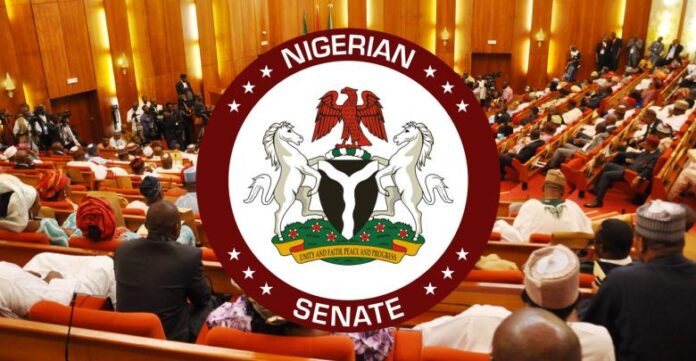Senate on Tuesday embarked amendment of Federal Inland Revenue Service (establishment Act, 2022) with intention to whittle down Presidential power to unilaterally grant waivers to both local and foreign investors.
The bill which was passed into second reading in the Senate chamber was sponsored by Senator Abdullahi Yahaya who expressed dissatisfaction with trillions of naira lost due tax waivers granted to the investors.
Leading a robust debate on the bill, Senator Abdullahi Yahaya explained that the major objective the proposed bill is to regulate the process of granting waivers to investors which have made the nation lost N6 trillion expected revenue and it has been observed that FiRS has consistently failed to meet its revenue target due to granting of waivers.
He said, ”The key objective of the Amendment Bill is to ensure regulated and a more organized processes of granting corporate tax holidays, import duty waivers and investment incentives to investors and businesses in the country.”
He added, ‘The Bill became necessary for two related reasons. One was the issue of drastic — shortfalls in government revenues, and consequent rise in deficit spending and high debt profile. Hence the need to block leakages and loopholes in tax collection and due remittances to government.
‘The other reason was the mounting financial demands to fund equally increasing government public expenditures, particularly our national budgets on public infrastructure, security and welfare commitments.’
According to him, The amended sections are as follows:
- Section (8), paragraph (I) to read; “Provide and maintain access to up-to-date and adequate data and information on all taxable persons, individuals, corporate bodies, and all agencies of government involved in the collection of revenue for the purpose of efficient, effective and correct tax administration, by building the required technological infrastructure and deploying same in ways as to eliminate tax fraud, evasion and avoidance.”
- Creating a new Section (9) in the Principal Act to provide for the following subsections as below:
“Coordinate all matters relating to the granting and monitoring of corporate tax and investment incentives, and relate them to existing economic realities, and publishing such reports for public awareness.”
“Offer technical advice to government agencies and institutions on all instances of granting of new or renewal of corporate tax incentive agreements and ensure that all agreements contain longterm/stability clauses and secure due legislative approval of the National Assembly.”
‘’For purposes of transparency, efficiency, effective monitoring and fair play, all requests and applications for parliamentary approval shall be referred to the Senate and the House of Representatives for necessary scrutiny. Such requests and applications for parliamentary approval shall stipulate clear conditions and justification for granting tax waivers and investment incentives.”
“All, or any other enactments specific to cases of granting investment incentives and tax waivers to businesses, institutions and individuals that conflict with the provision of this Act, shall be deemed, not applicable.”
In his contribution President of the Senate Ahmed lawan said that Nigeria is in a difficult situation in revenue generation that requires drastic measures to address
Lawan added that the senate in the coming days set up an adhoc committee to investigate all waivers granted to investors and Business in the Nigeria to help recover monies for the federal government
He said that some of the unnecessary wiavers Granted in Trillions should be returned to government coffers
He further lamented that the federal government cannot continue to grant waivers to individuals while it continues to borrow money to fund the economy.
After the debate on the bill , it was referred to the Senate Committee on Finance for further legislation as it was expected to submit the report in four weeks time.
























